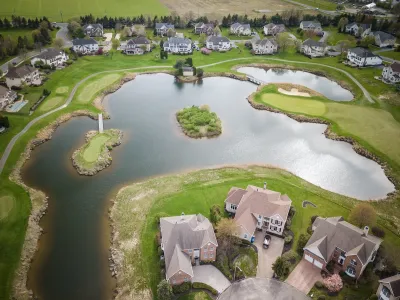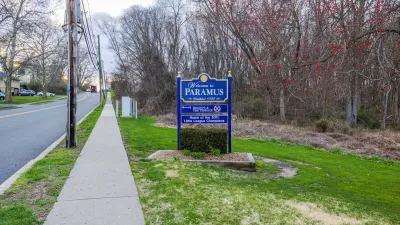The Mount Laurel Doctrine tasks each city and town with creating enough affordable housing to meet their needs, but half a century after its passage, the law still faces opposition in some parts of the state.

New Jersey’s Mount Laurel Doctrine, enacted 50 years ago, mandates that each municipality accommodate enough affordable housing to meet local needs. But as Michael L. Diamond explains in an article for Asbury Park Press, the law, which has led to the creation of 400,000 new housing units, still faces significant opposition from some local leaders. Some suburban towns argue that the quotas set by the state are unfair or arbitrary.
Governor Phil Murphy blamed this pushback for the insufficient housing supply, saying at an event commemorating the doctrine, “In New Jersey, we have wrestled with how to apply the principles of the Mount Laurel doctrine in practice, and along the way we've seen a slew of legal challenges that have sought to delay the development of new affordable housing units in the communities where they are needed most.”
The Mount Laurel Doctrine is the result of a 1970s lawsuit filed by Black residents against the city that made its way to the U.S Supreme Court, where the court ruled that “not only did Mount Laurel have an obligation to provide affordable housing, but also so did every other municipality.”
FULL STORY: NJ built 400K affordable homes since Mount Laurel decision 50 years ago; it's not enough

Manufactured Crisis: Losing the Nation’s Largest Source of Unsubsidized Affordable Housing
Manufactured housing communities have long been an affordable housing option for millions of people living in the U.S., but that affordability is disappearing rapidly. How did we get here?

Americans May Be Stuck — But Why?
Americans are moving a lot less than they once did, and that is a problem. While Yoni Applebaum, in his highly-publicized article Stuck, gets the reasons badly wrong, it's still important to ask: why are we moving so much less than before?

Research Shows More Roads = More Driving
A national study shows, once again, that increasing road supply induces additional vehicle travel, particularly over the long run.

Judge Halts Enforcement of Anti-Homeless Laws in Grants Pass
The Oregon city will be barred from enforcing two ordinances that prosecute unhoused residents until it increases capacity and accessibility at designated camping sites.

Advancing Sustainability in Los Angeles County Schools
The Los Angeles County Office of Education’s Green Schools Symposium brings together educators, students, and experts to advance sustainability in schools through innovative design, climate resilience strategies, and collaborative learning.

Using Old Oil and Gas Wells for Green Energy Storage
Penn State researchers have found that repurposing abandoned oil and gas wells for geothermal-assisted compressed-air energy storage can boost efficiency, reduce environmental risks, and support clean energy and job transitions.
Urban Design for Planners 1: Software Tools
This six-course series explores essential urban design concepts using open source software and equips planners with the tools they need to participate fully in the urban design process.
Planning for Universal Design
Learn the tools for implementing Universal Design in planning regulations.
City of Moreno Valley
Institute for Housing and Urban Development Studies (IHS)
City of Grandview
Harvard GSD Executive Education
NYU Wagner Graduate School of Public Service
City of Cambridge, Maryland
Newport County Development Council: Connect Greater Newport





























